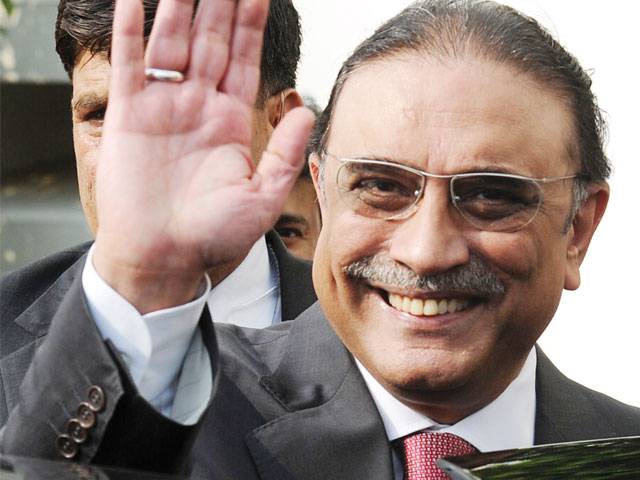ISLAMABAD - President Asif Ali Zardari stepped down Sunday, winning praise for completing a full five-year term but attracting criticism for leaving a country mired in economic and security strife.
Zardari became the first democratically elected president in the country’s history to complete his full term in office. His other major accomplishments include transferring power in democratic elections in a country plagued by military coups.
The 58-year-old widower of former prime minister Benazir Bhutto was treated to an honour guard from the armed forces and shook hands with staff before leaving the plush presidential palace.
He was driven away in a black luxury saloon car from the sprawling residence at the foot of the lush green Margalla Hills on the outskirts of Islamabad.
Never popular and always shrouded in controversy, Zardari - once jailed for 11 years for alleged corruption - is now likely to split his time between Pakistan and Dubai.
He retires six years after his wife's murder, having presided over the only civilian government in Pakistan to complete a full term in office and hand over to another at the ballot box.
Zardari became first head of state to leave presidency ceremoniously after completing his allocated five years in office. He took office in Sept 2008 after former military dictator general (retd) Pervez Musharraf resigned facing the threat of impeachment. Zardari announced not to contest for the second term after his party lost general elections in May this year.
Complete term of Asif Ali Zardari is marred by controversies and political cataclysms. During most of his term, he remained engaged with an intimidating judiciary and a powerful army. It was believed that Zardari will never return to office succumbing to pressure from army and judiciary when Memogate scandal broke out. This scandal was all about a purported letter written by Pakistan’s envoy in Washington to US authorities seeking help against army top brass. Husain Haqqani, Pakistan’s ambassador to Washington and a close ally of Zardari lost his post in Washington, while President suffered nervous breakdown and was admitted to a Dubai hospital where he spent several days.
Relations between Zardari and army fell to their bottom ebb after US Navy SEALS carried out Abbottabad operation to eliminate Osama bin Laden. It was believed (from the contours of Memogate) that President Zardari knew about American plans and played his role in facilitations.
Money laundering cases registered during second tenure of Mian Nawaz Sharif continued to haunt him throughout his tenure. The Supreme Court constantly pursued government to get the cases reactivated by writing a letter to Swiss authorities in this regard. Yousaf Raza Gilani had to relinquish premiership for not complying with the court orders.
Zardari said on Saturday that he has no ambitions to run for any political office in future. He further added that he will reorganise Pakistan People’s Party after stepping out of office.
Analysts count his government’s completion of a full term in a hostile political environment to his credit, as well as his strong stance against militancy. However, economic mismanagement and a failure to tackle the country’s energy crisis hurt Zardari’s popularity, they say.
Zardari, who later arrived at his newly-built villa in Lahore, told party workers that he would further strengthen democracy by re-organising his party. "I want to set up new traditions. We have strengthened democracy, we have empowered women by appointing them as speaker and the foreign minister. We will further strengthen democracy by cooperating with our opponents," he said.
Zardari said his party was still taking the "war for democracy" ahead. "Our mandate was stolen by the forces which want to destabilise Pakistan. But we accepted that mandate to strengthen democracy. We did not lose the war but have taken it ahead for the cause of democracy," he said.
He also pledged support for Nawaz Sharif in the battle for democracy. "I want to tell Nawaz Sharif, we will not let you weaken. We will fight shoulder to shoulder with you against the forces which want politics of gun instead of the politics of ballot."
Asif Ali Zardari’s successor Mamnoon Hussain is to be sworn in on Monday (today).
A businessman and close ally of Prime Minister Nawaz Sharif, Hussain's low-key persona and lack of personal power base will put him in stark contrast to Zardari.
Aides deny that Zardari, unpopular and divisive within the PPP, will spend most of his time abroad and insist he will concentrate on trying to revive the centre-left party.
The PPP ran a rudderless general election campaign and has been thrust into its greatest crisis, suffering a crushing electoral defeat without a Bhutto at its helm.
Friday, April 26, 2024
Zardari exits with grace

Int’l mathematics conference begins today at GCU
April 26, 2024
4 hostages recovered in Ghotki operation
April 26, 2024
Economic Challenges
April 26, 2024
No Compromise
April 26, 2024
Strength and Solidarity
April 26, 2024
Musk vs Australia
April 25, 2024
Reforming Rehab
April 25, 2024
Photon power
April 26, 2024
Justice prevails
April 26, 2024
Ending animal suffering
April 25, 2024
AI governance
April 25, 2024
AI concerns
April 25, 2024
ePaper - Nawaiwaqt
Advertisement
Nawaiwaqt Group | Copyright © 2024





